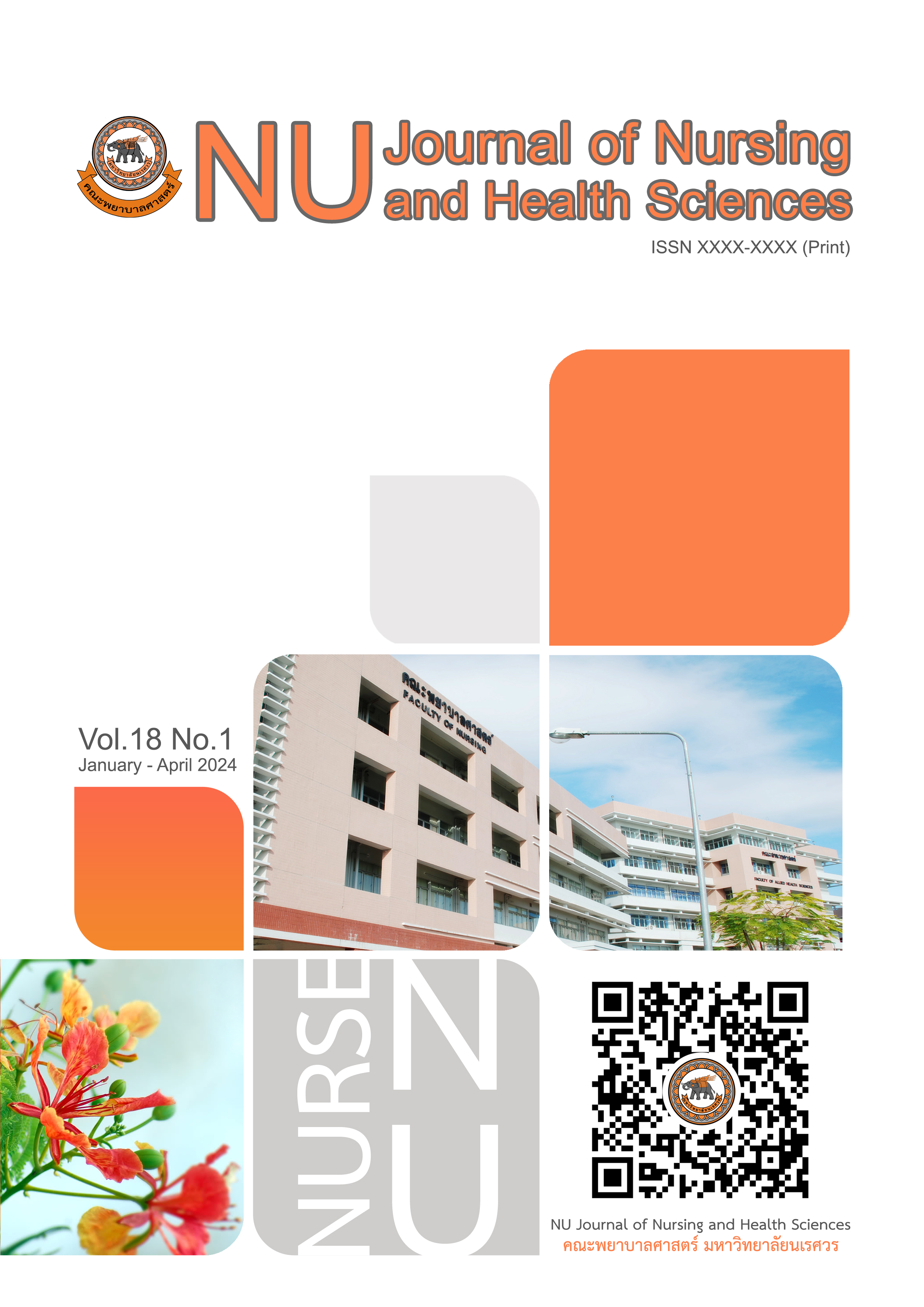Development of a Health Literacy Promotion Model for Older Adults in an Elderly School
Main Article Content
Abstract
This research and development project aimed to develop a model for promoting health literacy in the prevention and control of non-communicable chronic diseases within elderly schools. Research methodology was divided into two phases: 1) Model Development phase emphasized on model drafting based on health literacy framework proposed by Sorensen et al., supplemented by reports on needs and situation analyses of health literacy promotion among older adults. This process involved focus group meetings with 10 stakeholders, and 2) Model Implementation phase focused on implementing the developed model with elderly school members and compared the average health literacy of the elderly. The evaluation involved 23 members from an elderly school, chosen through simple random sampling. Additionally, the assessment of stakeholders' satisfaction with the model were conducted in 15 stakeholders shared characteristics akin to Phase I participants. The research instruments, including semi-structured interview questionnaires, health literacy questionnaires, and satisfaction questionnaires, were developed by the researchers. Content validity was tested by three experts, resulting in the indices of congruence (IOC) ranging from 0.67 to 1.00. The reliability of the health literacy questionnaires was tested with data collected from 27 older individuals, achieving a Cronbach's alpha coefficient of 0.95. Qualitative data were analyzed using content analysis, while quantitative data were subjected to statistical analyses, including frequency, percentage, mean, standard deviation, and paired sample t-test.The revealed that: 1) the Health Literacy Promotion Model consisted of three key components: motivation building, knowledge dissemination on health behavior management, and training in health literacy and self-management skills; 2) Effect of the model: After participating in the model, the sample group exhibited a significant increase in their mean health literacy scores compared to their pre-experiment levels (t = 2.96, p = .007) ; and stakeholders expressed a high level of satisfaction with the developed model ( = 4.23, S.D. = 0.67). It is suggested that the developed model utilize in other elderly schools with similar context to promote health literacy of older adults.
Article Details

This work is licensed under a Creative Commons Attribution-NonCommercial-NoDerivatives 4.0 International License.
References
Chaiyanukool, T. (2020). Development of health literacy of the elderly at Khamkrang Sub-district, Detudom District, Ubon Ratchathani Province. Journal of Health Science, Thaksin University , 2(3), 73-79. [In Thai].
Division of Non-Communicable Diseases. (2021). Annual report 2020. Bangkok: Graphic and Design Publisher. [In Thai].
Division of Non-Communicable Diseases. (2022). Number and death rate from 5 non-communicable diseases (2017 –2021). Retrieved from https://www.thaincd.com/2016/mission/documents.php?tid=32&gid=1-020. [In Thai].
Faul, F., Erdfelder, E., Lang, A.G., & Buchner, A. (2007). G*Power 3: A flexible statistical power analysis program for the social, behavioral, and biomedical sciences. Behavior Research Methods, 39, 175-191.
Foundation of Thai Gerontology Research and Development Institute (TGRI). (2021). Situation of the Thai older persons 2020. Nakhon Pathom: Institute for Population and Social Research, Mahidol University. [In Thai].
Jirawongnusorn, S., & Chitmanasak, N. (2022). Development of a health literacy model to enhance health behaviours according the “3A” principle of the elderly. Journal of Roi Kaensarn Academi, 7(4), 233-249. [In Thai].
Kaeodumkoeng, K. (2018). Health literacy: Access understand and application (2nd ed.). Bangkok: Amarin Printing &
Publishing Public., Ltd. [In Thai].
Kaeodumkoeng, K., & Thummakul, D. (2015). Health literacy promoting in aging population. Journal of Health Science Research, 9(2), 1-8. [In Thai].
Kanfer, F.H., & Gaelick-Bays, L. (1991). Self-management method. In F.H. Kanfer, & A. Goldstein (Eds.), Helping people change: A textbook of methods (pp.305-360). New York: Pergamon press.
Meebunmak, Y., Intana, J., Kijnopakieat, K., Khamthana, P. & Rungnoei, N. (2019). Health literacy among older adults in a Semi-Urban Community in Ratchaburi Province. The Southern College Network Journal of Nursing and Public Health, 6 (special), 129-141. [In Thai].
Meiner, S. E. (2015). Gerontologic nursing (3rd ed.). St. Louis, Mo.: Mosby.
Polit, D. F., & Hungler, B.P. (1999). Nursing research : Principles and methods (7th ed.). Philadelphia: Lippincott Williams & Wilkins.
Puttha, N., & Chalardlon, P. (2022). The development of health literacy activities of self-care for elderly in the new-normal Banlueak Subdistrict, Photharam District, Ratchaburi Province. Journal of MCU Nakhondhat, 9(3), 46-64. [In Thai].
Songthai, N., Chaichanawirote, U., & Pakanta, I. (2022). Health literacy promotion model for prevent non-communicable diseases (NCDs) and complications among older adults in Seniors’ School (Research report). Phitsanulok: Naresuan University. [In Thai].
Sorensen, K., Van den Broucke, S., Fullam, J., Doyle, G., Pelikan, J., Slonska, Z., & Brand, H. (2012). Health literacy and public health: A systematic review and integration of definitions and models. BMC public health, 12 (80), 1-13. https://doi.org/10.1186/1471-2458-12-80
Sriyasak, A., Sarakshetrin, A., Tongphet, J., Ket-in, V., Utaitum, N., Mookui, S., & Meesub, T. (2021). The development of health literacy for health management of older persons with diabetes and hypertension in primary care cluster context: Case study in Phetchaburi Province. Journal of Health Systems Research, 15(2), 155 -173. [In Thai].
Wold, G. H. (2012). Basic geriatric nursing (5th ed.). St. Louis, Mo.: Mosby.


